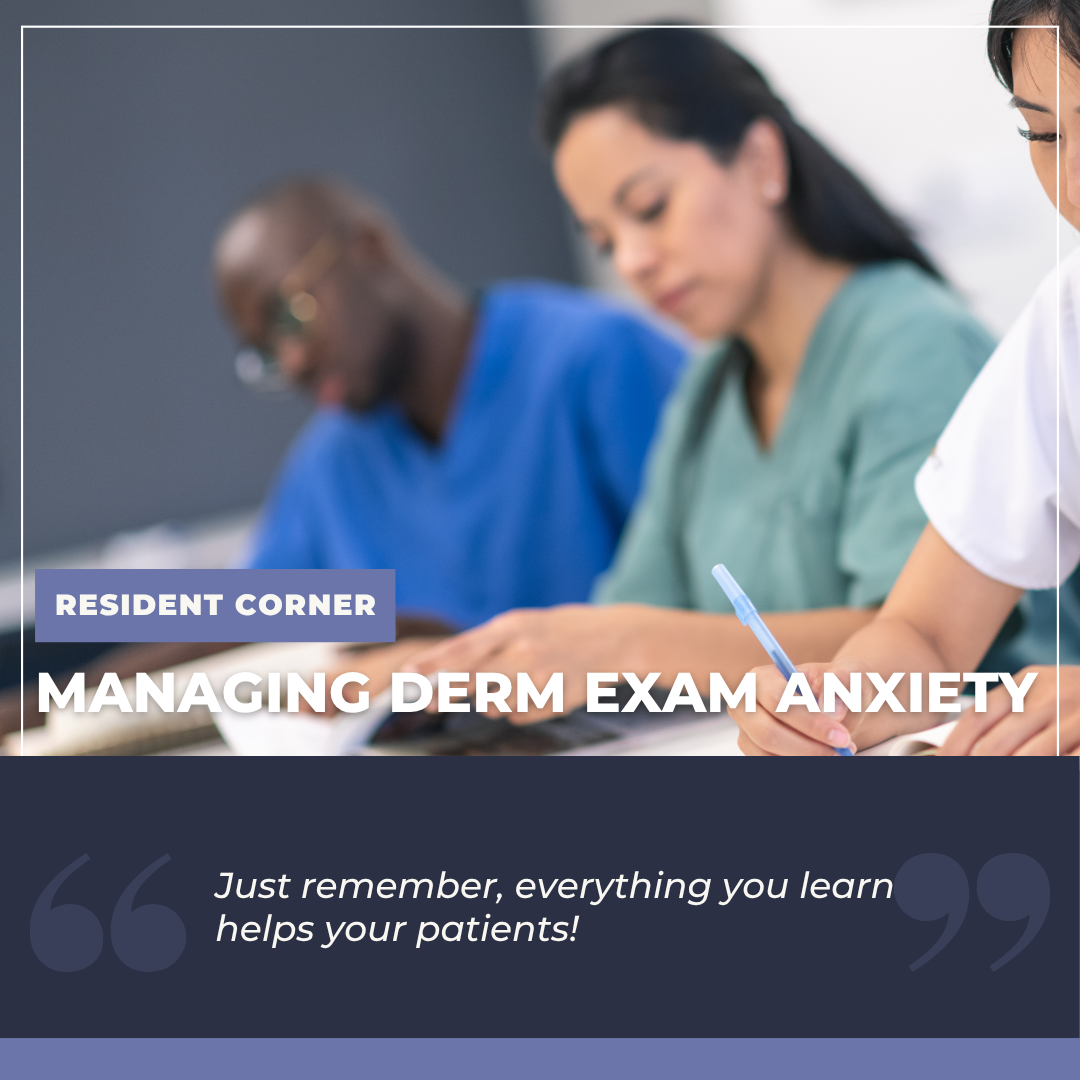Something they may not tell you when applying to dermatology residency (and I didn’t know until I started) is that, while all specialties have board exams, we have a lot of them! The American Board of Dermatology (ABD) pathway to certification requires derm residents complete a Basic exam during the first year, four Core exams (medical, pediatric, surgical, and dermatopathology) between the second and third years, and the final Applied exam in July after graduation. While this “new” (from 2018) staged pathway is intended to spread out the vast amount of new and complex information we must learn in dermatology, it also spreads out the stress across most of our training. Reflecting after completing the cores and with the Applied exam looming, here are some thoughts on managing derm exam anxiety.
“Everything you learn helps your patients”
I will never forget what one of my attendings said to me after the basic exam two years ago. A co-resident and I were discussing our less-than-perfect performance during our department didactics the day after the results were released. One of our attendings overheard and said to us, “just remember, everything you learn helps your patients!” This line has resonated with me deeply and was something to fall back on every time I started to get the jitters before one of my exams. While it may sometimes feel like it, these exams aren’t meant to trick or confuse us, or to hold us back in training. At the end of the day, the ABD needs to ensure we all have the skills and knowledge to safely evaluate and treat our patients in the future. It is no surprise that the average pass rates between 2021-2025 are >95% for core exams (even dermpath!) and ~97% for the applied exam (it was 99.1% this year). So: remember the end-goal! We all want to do the best we can for our patients, and part of this means a lot of learning and memorization along the way.
There’s no right or wrong way
While the Basic and Applied exams are offered on fixed dates, the core dermatology exams are more flexible. The ABD offers these during two-week windows in February, July, and November, and residents can complete them in any order or combination. There is also the option to do the core exams virtually or in-person at a testing center. This flexibility can, paradoxically, also become a source of anxiety. Is it best to get them done sooner, or space them out? Does medical derm pair better with peds, or with dermpath? Is the morning better than the afternoon? At the end of the day, there is no right or wrong way to do these exams! Knowing when the exams are offered, the registration period, and your own preferences will allow you to plan a schedule that works best for you. My preference was to do medical derm and dermpath in February, then peds and surgery in July (after completing my 10-week peds rotation), with both days at a testing center. But I have friends who did their exams at home or at our clinic building, went on their honeymoon and did one core in July, or skipped the July window altogether to enjoy the summer!
Prepare on your own terms
Just as there are multiple ways to take the core exams, there are multiple ways to prepare for them. Which is the best textbook, Anki deck, question bank, or review course? Again, at the end of the day, the best study resource are the ones that work for you! Know your study style, make a plan (or a concept of a plan!), and set your own boundaries. Find creative ways to incorporate learning into your daily routine. For me, this meant watching a Dermnemonics or Boards University video on the bike at the gym or listening to the Derm In-Review audio study guide on the way to and from work. But I still tried to keep up with podcasts, phone calls to friends and family, and my goal of listening to at least one non-medical audiobook a month!
Find what you love in derm
One of the things that got me through core exam prep was finding topics that I loved from each area in dermatology. I found joy in learning about genodermatoses, basement membrane biology and blistering dermatoses, special stains in dermpath, and cutaneous oncology/oncodermatology as part of the surgery core. This in turn helped me power through areas that were less my cup of tea (such as infectious dermpath or surgical flaps). You never know what you might learn about yourself during the learning journey. Maybe you discover a love for laser physics, or autoimmune connective tissue disease, or ichthyoses – and then become a career expert in that field!
Did you enjoy this article? Find more on Navigating Residency here.

